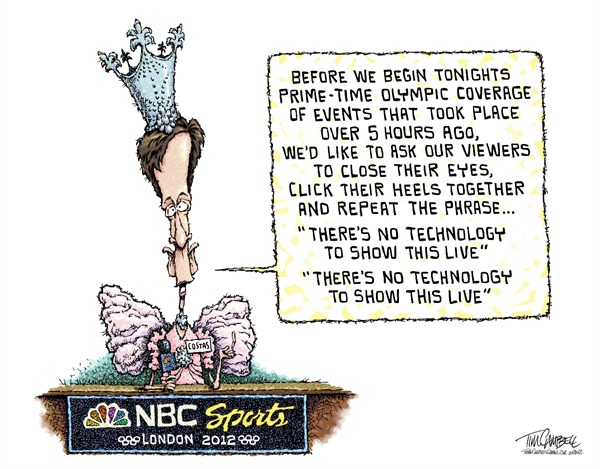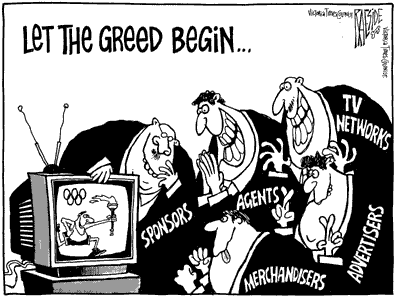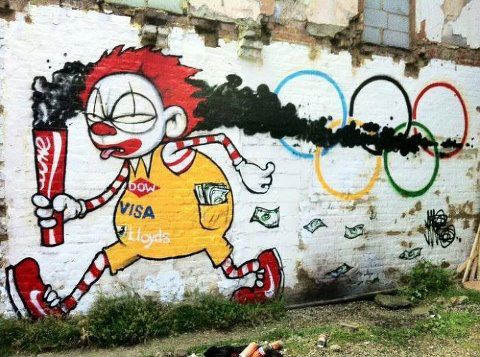From the Tampa Bay Times, "Team USA Wins No Gold Medals for Internet Access," by Susan P. Crawford of Bloomberg News, on 8 August 2012 -- The opening ceremony of the London Olympics showed us the Internet's history by honoring Tim Berners-Lee, the inventor of the World Wide Web, and featuring a display of his live Twitter post: "This is for everyone."
Unfortunately, the Games as a whole are providing a less inspiring vision of the Internet's future, at least in the United States.
People in at least 64 territories around the world are able to watch free live streaming video of every event; 3,500 hours on 10 separate real-time channels are being made available online by YouTube. Yet in the United States, this coverage is only available to those who pay for a cable, satellite or telephone company TV subscription that includes MSNBC and CNBC. (About 7.8 percent of this streamed Olympic content is available over the air in the United States.)
If you're a nonsubscriber, almost the only way to get access to these multiple live streams is through a proxy server that shields your location — IP addresses can be tied to geography — or through other, possibly illegal, means. The group Global Voices Advocacy reports that the file-sharing site Pirate Bay, where users could upload video of Olympic events for all to see, briefly renamed itself "The Olympic Bay," with the saucy tagline, "This is for everyone."

Concentration in Internet access and the close corporate connections between distributors and programmers have brought us to this point: NBC Universal has all the rights to Olympics coverage. The network's majority owner — Comcast Corp., the largest U.S. broadband company — has decided that Americans shouldn't get access to these live streams without paying. In Britain, where the British Broadcasting Corp. isn't trying to monetize every second of Olympic fervor, the streams are available over the air and online. (Many Americans have logged on to virtual private networks that make their computers appear to be signing on to the BBC site from a British location. The "special relationship" reborn in zeros and ones.)
Even if Americans were allowed to watch these online streams, about a third of us don't subscribe to broadband. Those who do are paying more for less: A recent study by the New America Foundation found that about $35 a month will buy symmetrical download and upload speeds of 500 Mbps in Hong Kong; people in New York City or Washington pay that much for service that is as much as 20 times slower.
The United States isn't upgrading to fiber, with its enormous capacity to support uploads as well as downloads. Only 14 percent of Americans will be able to subscribe to Verizon Communications' FiOS (fiber-optic) service, which offers the speeds that the rest of the world is used to. The rest of us will make do with our local cable incumbent's cramped uploads.
One of the reasons we love watching the Olympics is its celebration of competition among nations. We could take a lesson from the Games when it comes to high-speed fiber Internet access.
Other countries are focusing on wiring their citizens' homes and businesses. We aren't: About 5 million Americans have subscribed to FiOS, or about 6 percent of all wired broadband subscribers. Meanwhile, according to the Organization for Economic Cooperation and Development, about 63 percent of Japanese broadband customers have fiber connections to their homes; in South Korea, 58 percent do; in Sweden, it's 30 percent. Australia plans to reach 93 percent of its population with fiber.
We seem bent on providing the technological equivalent of the Olympic sport of dressage — high-speed Internet access only for rich people. We're prancing around a core market failure that is undermining the future of our economy. The Internet was supposed to be for everyone. [Susan P. Crawford contributor to Bloomberg View . (source: Tampa Bay Times)]





No comments:
Post a Comment